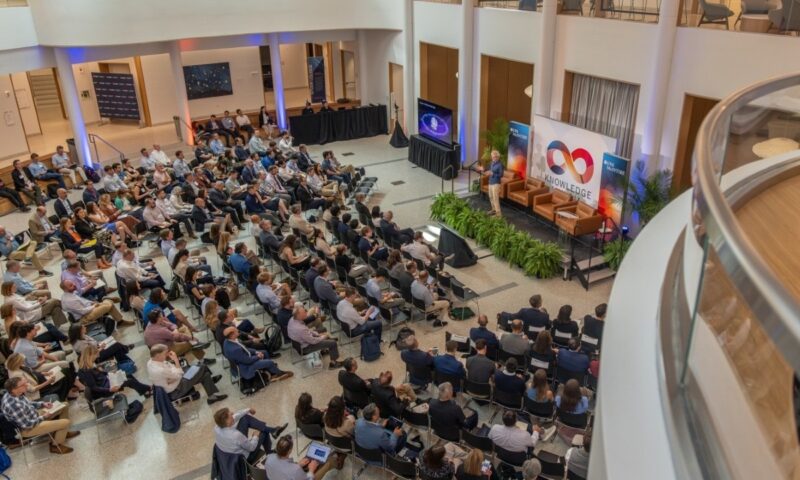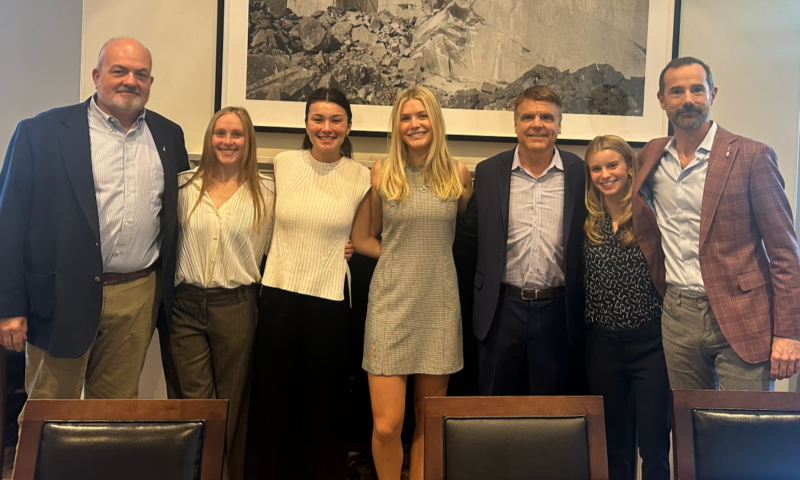
Geoffrey Moore
Combining fresh, strategic ideas with practical, real-world applications, the McIntire School’s 2017 Knowledge Continuum provided an insightful learning experience featuring the rare opportunity to attend an interactive videoconference with prominent business author, adviser, and visionary Geoffrey Moore.
For the 34 IT and management professionals assembled at McIntire’s Rouss & Robertson Halls last month, the greatly anticipated keynote offered an hour with one of world’s leading authorities on technology adoption and the market dynamics of innovation. Moore supplied invaluable guidance for understanding IT enterprise investment and navigating the complexities of today’s ever-changing business landscape.
Sponsored by the Center for the Management of Information Technology (CMIT), this year’s edition of the event further advanced the Center’s 25+-year tradition of arming executives with leading-edge solutions through a motivating series of discussions, research reports, case studies, and attendee networking. Adding to an already exciting program, Moore featured as a speaker of interest on a lively daylong agenda led by IT Professor Ryan Nelson, Associate Dean for the Undergraduate Program, and Coordinator of the M.S. in MIT Program’s “Project Management” module.
The schedule of sessions promoted inventive, actionable approaches by a wide range of experts addressing a variety of pressing challenges. Highlights included IT Professor Ahmed Abbasi discussing text and social analytics adopted to capture business value and Capital One Financial Corporation Vice President of Technology Jay Sanne (A&S ’93, M.S. in MIT ’05) recounting his company’s DevOps journey. IT Professor Ryan Wright endorsed an empowering, human approach to cybersecurity, while Nelson and IT Professor Stefano Grazioli partnered to demonstrate the “design sprint” approach to digital innovation developed at Google Ventures. And, of course, Moore targeted his recognized area of expertise: disruptive innovation.
Nelson, longstanding CMIT Director since its founding in 1991, was enthusiastic and appreciative to have Moore’s contributions for the event: “I’ve been a student of his work for many years—a couple of decades, actually. We’ve been learning from his books and articles at both the undergraduate and graduate levels and used his Harvard Business Review articles in the ‘Digital Innovation’ class just this past semester.”
Videoconferencing from the West Coast, Moore’s timely discussion drew from his latest book, Zone to Win: Organizing to Compete in an Age of Disruption, while incorporating the most current market and tech trends. His observations and advice focused chiefly on the difficult choices companies face when reprioritizing their resources and the crucial decisions larger firms need to make when contending with a world of disruptive innovations “where the marginal cost approaches zero.” While the success of many newer technologies is driven by the promise of a seemingly effortless cloud infrastructure, Moore contended that the reality of the transformation process comes with its own set of risks: “What is free for a start-up is actually somewhat painful for an established enterprise.”
The author supplemented his frank assessment of the problems inherent in competing against industry-wide disruption by offering a sound methodology for recognizing internal challenges and making tough decisions. He preached a steady course of action based on realistic expectations and a business-wide commitment to long-term transformational development, which he insisted must start directly with the CEO. Explaining that to emerge as a true disruptor is the longest of long shots, Moore noted that most enterprises find themselves operating in “zone defense” mode, forced to shift away from old organizational models to resuscitate a core segment of their business to sustain valuation—or merely stay afloat. “This is a new world,” Moore cautioned, “so you have to catch the next wave. It becomes an existential threat if you don’t.”
“These are the themes Geoffrey Moore is famous for: disruption and how it applies—not only to start-up firms—but also to large, established firms,” Nelson said, stressing the relevance of the influential business writer’s message. “Based on what we heard today, disruption is an issue that many of our participants have identified as a key challenge they’re facing. We are very grateful to Dr. Moore for joining us and taking the extra time to address questions from the participants.”


